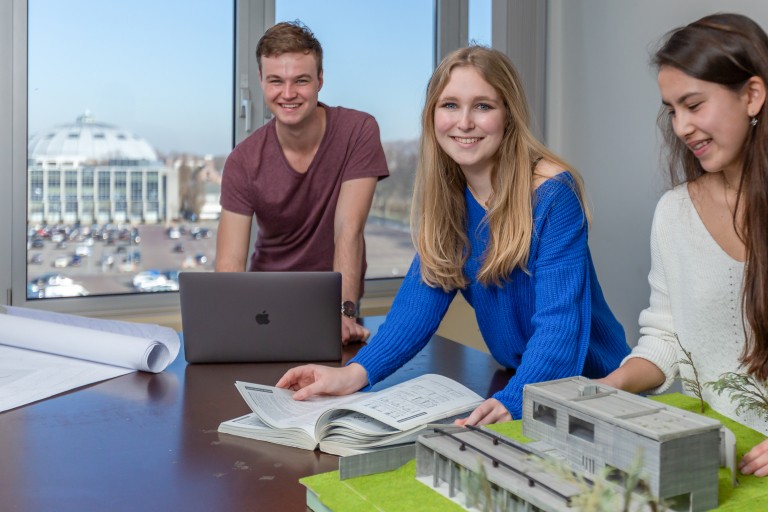What does an Urban Designer do?
As an urban designer, you shape the way cities, towns, and regions look. You decide where homes, roads, green spaces, and facilities are located. In doing so, you create environments where people can live, work, and thrive comfortably.
Take a look at the Built Environment job profiles
Built Environment alumni

Alumnus Joost about his job and graduation placement
Joost Kleinhaarhuis studied Urban Planning at NHTV (now BUas). He graduated in Mexico City in 2005, where he had to travel three hours to get from one campus to another. At the moment, he is a traffic planner in his own student city – Breda!

Transport Developer Roy works in the office and sometimes on the bus
We often see alumni return to the BUas campus, but never behind the steering wheel of a city bus. But that’s what Roy has done! He works four days a week as a Transport Developer for Arriva and spends one day a week behind the wheel of a city bus.
Choose Built Environment at BUas
At a time when sustainability and quality of life are becoming increasingly important, the future is in your hands. The Built Environment programme offers you the chance to reshape cities, towns and infrastructure. Design not only the world around you but also your own future!
Continue studying?
If you decide to continue your education, the possibilities are endless. BUas has made arrangements with two educational institutions that will allow you to prepare better and progress more quickly in your further studies.

FH Joanneum, Austria
At FH Joanneum in Kapfenberg (Austria, near Graz) you can study a professional master's degree in Energy and Transport Management. Because there is an overlap between this master's degree and the BUas Mobility specialisation, this two-year master's programme can be compressed to 14 months. To encourage foreign students to come and study in Austria, they do not have to pay tuition fees. Accommodation in a student room on the Kapfenberg campus costs about €230 per month (including utilities).

Utrecht University
At Utrecht University, you can move on to an academic master's in Spatial Planning or Urban and Economic Geography. The connection between these master's degrees and the BUas specialisations of Mobility and Spatial Planning has been optimised. The pre-master's track can be combined with the final year at Breda University of Applied Sciences, after which there is direct access to obtaining a master's degree at Utrecht University in one year.
Frequently asked questions about Built Environment
If your question is not listed below, feel free to ask in the chat. Our students will be happy to help!
- What do you do in the Built Environment programme?
The Built Environment programme trains you to become a professional who contributes to the design of sustainable and liveable cities and regions, whether in the field of mobility, urban design or spatial planning. The programme combines theory and practice, allowing you to work on real issues faced by businesses and government agencies.
- Within which sectors can you work with a degree in Built Environment?
With a degree in Built Environment, you will be equipped to work across a broad range of sectors that shape and manage our physical surroundings. These include spatial and urban planning (e.g. local governments and planning agencies), mobility and infrastructure (e.g. transport companies, Rijkswaterstaat), urban development and design (e.g. architectural firms), sustainability (e.g. public and private sector), civil engineering and construction (e.g. engineering firms), as well as research and advisory roles. You will develop a broad, multidisciplinary profile that will enable you to contribute to a liveable, sustainable and accessible environment – at every scale, from neighbourhoods to global cities.
- What are my prospects of finding a job after Built Environment?
Around 92% of graduates find a job at a bachelor's level, of which 80% find a job in the field of Built Environment.
- How much will I earn?
Graduates earn an average gross montly salary of around €2,727, based on a 37-hour working week (Source: Studiekeuze 123).
